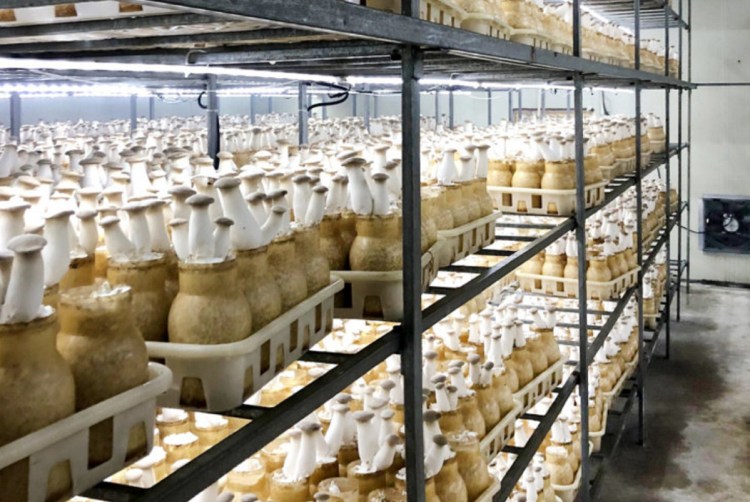AUBURN — City officials believe mushrooms – a lot of mushrooms – are a great fit for Auburn.
After a recent trade trip to China alongside a company that has already invested in the city, Mayor Jason Levesque and Economic Development Director Michael Chammings say a large-scale mushroom-growing operation is the project “closest to reality” for Auburn.
It could be as large as 15 acres, with multiple climate-controlled buildings where 150 to 200 people would be employed.
“Auburn has the infrastructure, trucking, land, we have the skill set, we’re located perfectly to facilitate large-scale industrial agriculture in Auburn,” Levesque said Thursday.
Chammings said Nianping Wang, president of Mingjing Industry Group Co., is studying the feasibility of such a facility in Auburn. Wang and business partner Fang Cheng Morrow were behind the reinvestment in Prospect Hill Golf Course, and have since been exploring options for more projects.
Wang was among the hosts for Levesque and Chammings during their recent two-week trip to China, where they toured mushroom operations, among other industries. In photos shared by the pair, mushrooms appear growing on stacked shelves in hundreds of rows.
“Think really large walk-in coolers,” Levesque said.
Levesque said one objective of the trade trip to China was to “build legitimacy for government approval of foreign investment.” In China, foreign investment is contingent upon approval from the central government.
“(Wang) wanted to show their government that he’s dealing with governments from the state of Maine, which would be using the money toward an agricultural resource,” Chammings said.
Levesque said only about 20 percent of mushrooms consumed in America come from domestic sources, meaning there is a demand for locally produced mushrooms.
They believe Auburn is set up perfectly to host this type of business.
Depending on the type of mushroom, grow cycles can range from two to five weeks, after which they are harvested, processed and shipped. Levesque said Auburn is in the perfect location geographically to ship the mushrooms to consumers in Maine and beyond.
Chammings said in the Chinese facilities they toured in September, almost 100 percent of the materials used in each grow cycle were recycled. He said it was “extremely clean, with absolutely no smell” in the facility. Most people driving past it would not know what it is, Levesque said.
In recent years, Maine has seen an increase in the year-round market for locally grown specialty varieties of mushrooms. The Auburn venture would likely become the largest industrial mushroom-growing operation in Maine.
Chammings said the project would also be “environmentally friendly and sustainable,” and could place Auburn in a unique position as food production is beginning to shift to more sustainable food sources for health and environmental reasons.
Wang first came to Maine when his daughter was attending Hebron Academy, and that exposure left him with a good impression of the area, Morrow said last year. They’ve since invested in Prospect Hill while pursuing the mushroom cultivation project.
Chammings said part of the feasibility process is scouting potential locations. Auburn has a lot of options, he said, but the facilities would require land with utility access.
One stumbling block is the frosty relations between the United States and China, which are in the middle of a heightened trade dispute. While the Auburn officials received a warm welcome in China, they said the trade situation was often referred to in conversations.
The next step in the process likely would come in February or March, when Wang – who is building a home near Prospect Hill – and an interpreter come to Maine, Chammings said.
“This is a great economic development opportunity because it’s agriculture, which Auburn has a strong history with, but it’s also industrial in scale,” Levesque said. “This is showing the evolution of agriculture.”
arice@sunjournal.com
Send questions/comments to the editors.


